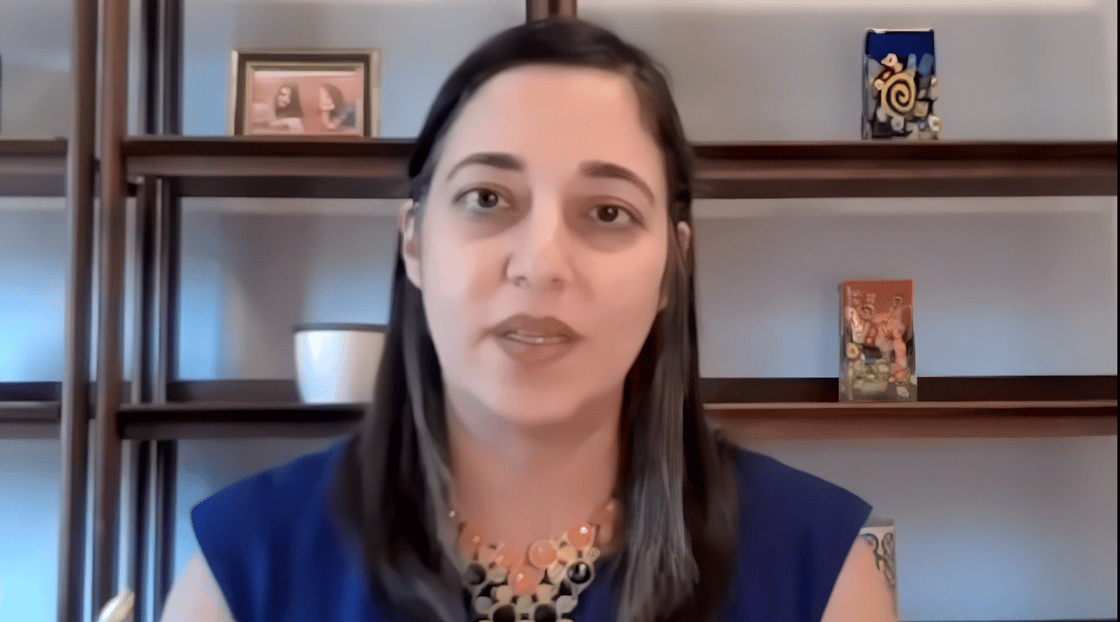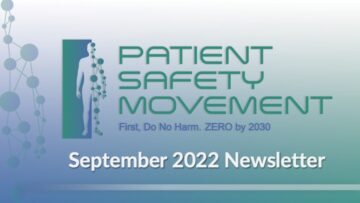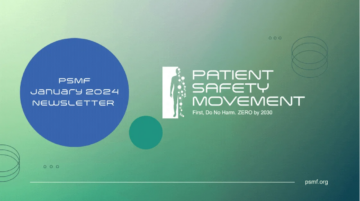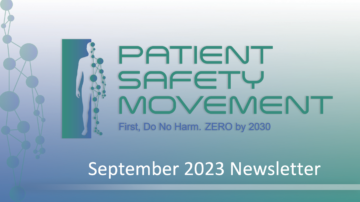“If you are principled and you do the right thing for the right reasons, good things will eventually happen.”
Joe Kiani, Founder
Patient Safety Movement Foundation
Letter from CEO

We are pleased to announce that one of our Governance Board members, Professor Najmedin Meshkati, from the Department of Civil/Environmental Engineering and Department of Industrial and Systems Engineering at the University of Southern California, is one of 24 experts appointed by the Federal Aviation Administration who will review Boeing’s safety management processes and how they relate to Boeing’s safety culture.
For the past 35 years, Professor Meshkati has been teaching and conducting research on risk reduction and reliability enhancement of complex technological systems in the nuclear power, aviation, petrochemical, and transportation industries. He has inspected many petrochemical and nuclear power plants around the world, including Chernobyl, Fukushima Daiichi, and Daini. In addition, Meshkati has worked with the US Chemical Safety and Hazard Investigation Board, as an expert on human factors and safety culture, on the investigation of the BP Refinery explosion in Texas City. He has been teaching at USC’s internationally renowned Aviation Safety and Security Program for the past 30 years. Professor Meshkati, thank you for all you are doing for global safety.
November is the month that recognizes Alzheimer’s disease. It is the sixth leading cause of death in the United States, and more than 6 million Americans are living with the disease. A small hope for the future, the new drug Aducanumab has received accelerated approval as a treatment for Alzheimer’s. It can remove beta-amyloid from the brain of patients with early Alzheimer’s and slows down the cognitive and functional decline.
Earlier this month, I was honored to be invited to give a keynote address at the International Society of Pharmacovigilance virtually in Bali Indonesia. This was an excellent meeting focused on medication safety.
An embarrassment for US healthcare is that we have the highest rate of maternal mortality and morbidity among high-income nations, especially among American Indian, Alaska Native, and Black mothers, those of lower socioeconomic status, and people younger than 18 years or older than 35 years.1 In 2021, more than 1,200 people died either during pregnancy or up to one year postpartum. Four out of five of these pregnancy deaths were considered preventable.2,3 We must improve access to good maternity care.
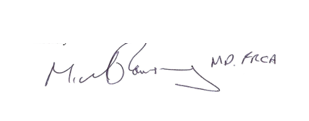
Michael A.E. Ramsay, MD, FRCA, Chief Executive Officer, PSMF
1. Blanchi, D.W., et al. JAMA 2023; 330: 1729-30.
2. Centers for Disease Control and Prevention, “Four in 5 Pregnancy-Related Deaths in the U.S. Are Preventable.”, September 19, 2022
3. Hoyert, D.L. National Center for Health Statistics. Maternal Mortality Rates in the United States 2021. Centers for Disease Control and Prevention 2023.
Board Member Spotlight: Dr. Nasim Afsar
This month’s board member spotlight shines on one of our esteemed Governance Board members, Dr. Nasim Afsar. Dr. Afsar is Oracle Health’s Chief Health Officer and leads its Health Transformation Office. Dr. Afsar attended our very first Summit and has since been one of our most ardent supporters. She brings to her board role a clear vision and keen understanding of the essential contributions advanced technologies will make in improving patient safety across healthcare delivery systems globally.
World Pneumonia Day: November 12
A potentially fatal lung infection, pneumonia sickens 155 million children under 5 and kills 1.6 million around the world each year, making it the number one cause of death in children under 5—though it receives little media attention. It is primarily caused by viruses, bacteria, or fungi transmitted person to person. Fortunately, as World Pneumonia Day (November 12) reminds us, pneumonia is preventable and treatable.
Affordable and effective vaccines exist against the two most common bacterial causes of deadly pneumonia, as well as for the most common viral cause of pneumonia. And antibiotics costing less than $1 can cure a bacterial pneumonia infection if it is caught early enough.
For anyone 65 or older, the risk of hospitalization after getting pneumococcal pneumonia is 13 times greater than for younger adults 18 to 49, with an average hospital stay of six days. And severe cases can be fatal. Symptom onset can be sudden and may include difficulty breathing, shortness of breath, chest pain, high fever, excessive sweating, shaking chills, and coughing. Older adults, those with weakened immune systems, and people with certain chronic health conditions are especially at risk.
Though the CDC recommends all adults 65 years or older receive pneumococcal vaccination, vaccination rates among US adults remain low. The American Lung Association urges adults to ask their doctor if they are up to date on their CDC-recommended adult vaccinations and take a personal risk assessment at Lung.org/pneumococcal.
Patient Safety Initiatives in Ghana
.png?width=1120&upscale=true&name=MicrosoftTeams-image%20(1).png)
Knowledge is power—even the power to save a life. Thanks to Elijeko Foundation, lives are being saved in Ghana through preventive health education and free healthcare screenings. Andrews Kwabena Nyantakyi, a US Navy veteran and registered nurse, founded Elijeko Foundation, a 501(c)(3) nonprofit, in 2016. Elijeko’s primary mission is to nurture partnerships with communities to enhance health outcomes, with a specific focus on cardiovascular wellness and patient safety. Ghanaians are benefiting from Elijeko’s three primary initiatives:
The Bystander CPR Initiative: Cardiovascular disease is the number one killer worldwide and is especially prevalent in Sub-Saharan Africa. In 2021, Elijeko Foundation collaborated with the National Ambulance Service, the sole pre-hospital emergency service provider in Ghana, to provide comprehensive CPR education directly to Ghanaians where they live.
Patient Safety Advocacy: Harm from clinical malpractice is rising in Ghana. Elijeko Foundation is deeply committed to advocating for Ghanaians by providing educational support to healthcare facilities across the country. Through a series of workshops and facility visits, Elijeko encourages healthcare providers to commit to zero harm in their practices.
Kiosk Clinic Initiative: Through its Kiosk Clinic Initiative, Elijeko has ingeniously transformed shipping containers into “kiosks”—fully functional clinics strategically located across the country. The kiosks give Ghanaians access to free medical services, including screenings—access Ghanaians would not otherwise have without Elijeko and its partnerships.
Elijeko Foundation
November Is National Diabetes Month
As the holiday season gets into full swing, November is the perfect time to learn more about diabetes risk. As many as 212 million people, or half of all adults currently living with diabetes, are undiagnosed, according to the International Diabetes Federation (IDF). Most of them have type 2 diabetes.
In just a couple of minutes, anyone can take an online diabetes risk assessment designed to predict one’s risk of developing type 2 diabetes within the next 10 years. The test is based on the Finnish Diabetes Risk Score (FINDRISC) developed by Jaana Lindstrom and Jaakko Tuomilehto from the National Institute for Health and Welfare in Helsinki.
Knowing one’s risk is important because managing diabetes as early as possible is key to better health outcomes. The IDF reports that 72% of people living with diabetes surveyed globally received their diagnosis only because they already had at least one of the related complications. In addition to regular doctor checkups, diabetes can be managed, prevented, or its onset delayed by reducing stress levels, maintaining a healthy weight, staying active and exercising regularly, and eating well, particularly foods lower in calories, saturated fat, trans fat, sugar, and salt, but higher in fiber.
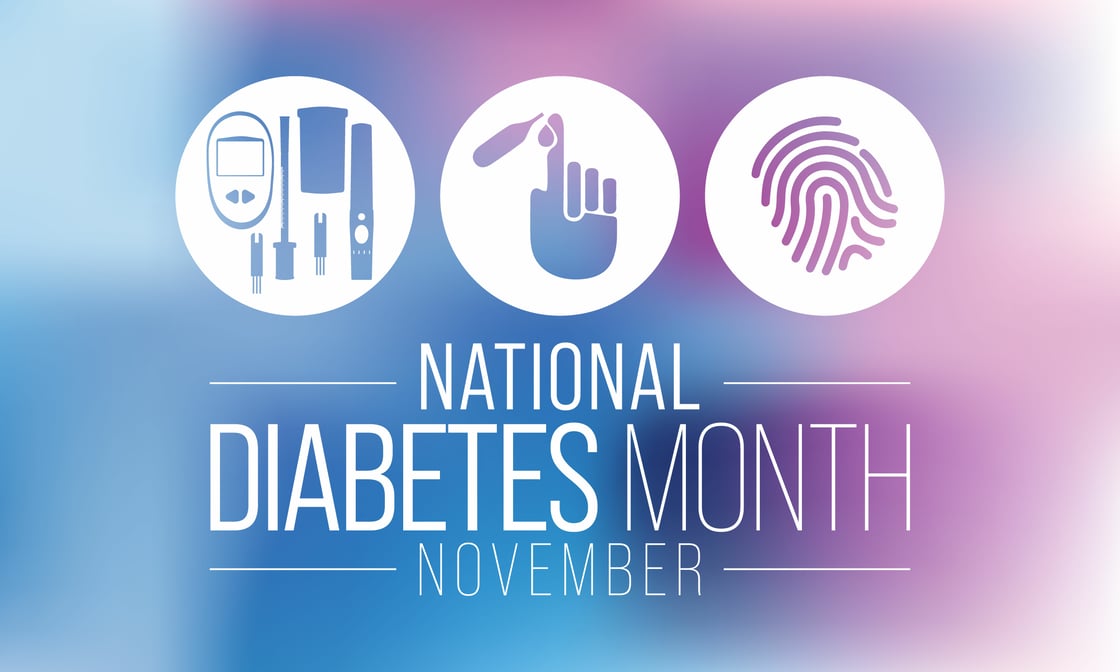
Unleashing Human Potential of the Workforce Is Key to Advancing Quality and Safety
As the CEO of the National Association for Healthcare Quality (NAHQ), I’ve seen my fair share of variabilities at healthcare facilities—large and small—around the country. However, it wasn’t until being a patient myself at a surgical center that I really understood just how behind the curve some organizations are when it comes to quality and safety in the workplace. And it was there that I better understood a root cause for the harm we see in healthcare.
While I was getting prepped for my procedure, I spoke with the nurse about delegation of tasks, accountability, and ultimately where quality and safety stood in the line of priority for the facility. She explained quality as a burden and safety as a reporting exercise that got “dropped in her lap.”
That simple conversation provided me with confirmation of the value of our mission at NAHQ, where we believe quality and safety are the paths to excellence. NAHQ’s lens for quality and safety is through workforce readiness—a topic that has been misunderstood or neglected for too long. This is why our focus is to support individuals and leaders to unleash the human potential of the workforce to make healthcare better.
So how do we do this? NAHQ created a solution called Workforce Accelerator, which measures the level and what type of work is being done to advance quality and safety. The approach provides a strategic advantage by offering the consistency of a common language and understanding across team members of an organization and over time, despite role changes, ensuring alignment with institutional goals. It also reports where upskilling is needed to inform customized professional development plans. Doing more with less and providing safe care means we must approach workforce role definition, professional development, and skilling with precision.
Over the last 24 months, NAHQ has executed this framework all over the country with organizations—small and large. NAHQ’s perspective is that quality and safety are unique disciplines; they are also inextricably linked. We believe strongly that when quality and safety are connected, our messages will be more unified—we will become more powerful as a community and as a movement—to make more progress on safety.
Together, we will create structural standards, including for workforce readiness, and as a result, we will have addressed one more opportunity to systematically improve quality and safety. We can do this. We are doing this—and healthcare is better because of it.
Stephanie Mercado
CEO, National Association for Healthcare Quality
.png?width=1120&upscale=true&name=MicrosoftTeams-image%20(4).png)
Liver Awareness Month
The American Liver Foundation encourages everyone to find out if they are at risk for fatty liver disease during National Liver Awareness Month in October. Nonalcoholic fatty liver disease (NAFLD) is one of the most common causes of liver disease in the US and the most common cause of liver disease worldwide, affecting as many as one billion people. In children, NAFLD rates have doubled over the past 20 years.
NAFLD causes excess fat to build up in the liver and has few or no symptoms. The exact causes for NAFLD are unknown, but research suggests genetics, digestive disorders, and diet may be contributing factors. NAFLD is rapidly increasing as a common cause of liver cancer—a leading cause of cancer deaths in the US among all races, ethnicities, and genders, representing 30,000 adult deaths annually. Another form of NAFLD, nonalcoholic steatohepatitis (NASH), causes inflammation of the liver and liver damage, which can lead to liver failure.
Two of the most common risk factors for liver disease are diabetes and obesity. Through a simple liver health quiz, available at ThinkLiverThinkLife.org, anyone can learn about their own risk factors and what to do next.
Innovation Corner*
Medplace is dedicated to enhancing patient safety through our cloud-based platform, which expedites peer and case reviews for swift problem detection. With a network of 700+ leading medical experts, we deliver comprehensive feedback promptly. Our platform ensures seamless access to critical medical insights, offering valuable perspectives on patient safety. By collaborating with organizations, we’re driving a future where accessing top-quality providers is seamless and prioritizes patient safety above all else.
*Patient Safety Movement Foundation does not endorse any specific commercial products, services, or companies. Information included in this section is merely to share the technologies that may improve patient safety.
In the News
- Last June, GhanaWeb featured the delegation from Elijeko Foundation that had just attended the Patient Safety Movement Foundation’s annual Summit.
- A study titled “Measurement of Ambulatory Medication Errors in Children: A Scoping Review” by the American Academy of Pediatrics noted that children are especially vulnerable to medication errors and there is no established set of quality measures for health systems to continuously measure and reduce harm from pediatric outpatient medication errors.
- A Maricopa County jury awarded the largest medical malpractice award in Arizona history, roughly $31.5 million, for Banner Health’s negligence during a delivery in which 33 different warning signs that the infant was oxygen-deprived were missed, according to a Phoenix CBS affiliate. The child, now 9, has cerebral palsy and is severely disabled.
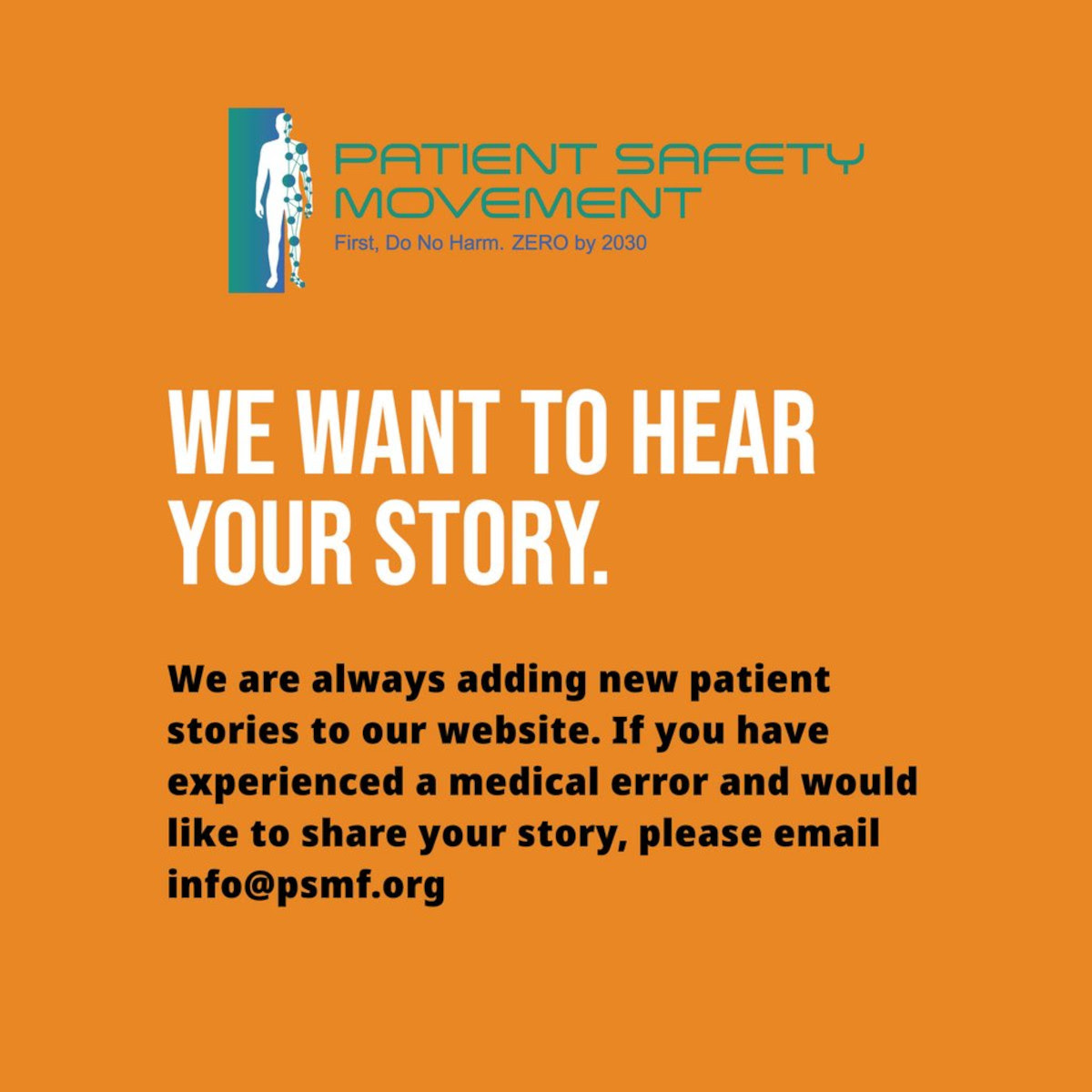
DONOR TESTIMONIALS — WHY I GIVE
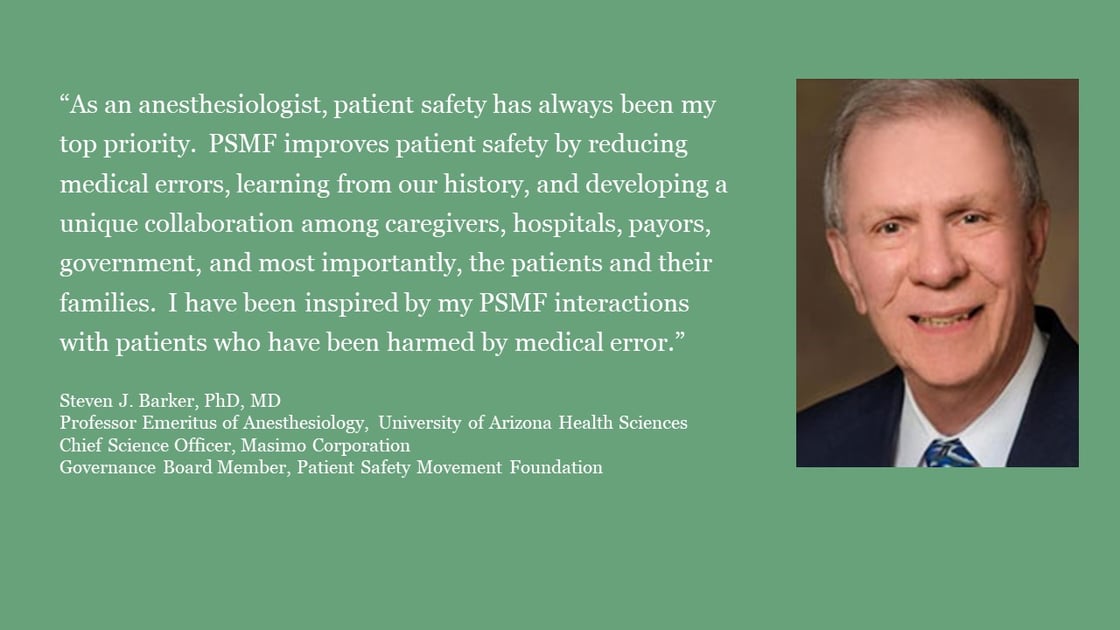
GOVERNANCE BOARD
Joe Kiani, MS, Founder and Immediate Past Chairman of PSMF, Founder, Chairman & CEO of Masimo
Mike Durkin, OBE, MBBS, FRCA, FRCP, DSC, Chairman of PSMF, Senior advisor on Patient Safety Policy and Leadership, Institute of Global Health Innovation, Imperial College London
Michael A.E. Ramsay, MD, FRCA, Chief Executive Officer, PSMF
Sarah Kiani, Director, Masimo Foundation for Ethics, Innovation, and Competition
Abbasseh Towfigh, MPD, Executive Director and Secretary, Ayeneh Foundation
Steven J. Barker, PhD, MD, Chief Science Officer, Masimo Corporation, Professor Emeritus of Anesthesiology, University of Arizona Health Sciences
Jannicke Mellin-Olsen, MD, DPH, Past President, World Federation of Societies of Anesthesiologists
Philip D. Lumb, MB, BS, MD, MCCM, FCCP, Professor of Anesthesiology, Keck School of Medicine, University of Southern California
Najmedin Meshkati, PhD, MS, Professor of Civil/Environmental Engineering, University of Southern California
Javier T. Davila, MD, Ambassador, PSMF in Mexico, Former Medical Director, Mexican Social Security Institute, Head of Medical Education, Research and Health Public Policy
Robin Betts, RN, CPHQ, MBA-HA, Vice Chair, PSMF, Vice President, Safety Quality & Regulatory Services, Kaiser Foundation Hospitals and Health Plan, Kaiser Permanente Northern California
Nasim Afsar, MD, MBA, MHM, Chief Health Officer at Oracle Health
Edward Kelley, PhD, Chief Global Health Officer, ApiJect Systems
David B. Mayer, MD, Executive Director, MedStar Institute for Quality and Safety
Omar Ishrak, PhD, Executive Chairman and Chairman of the Board of Directors, Medtronic, Chairman of the Board of Directors, Intel
Charlie Miceli, CPM, Treasurer, PSMF, Chief Supply Chain Officer, Network VP of University of Vermont Health Network
Vonda Vaden Bates, Patient Advocate, CEO, 10th Dot
Alicia Cole, Patient Safety Consultant
Jim Messina, BA, CEO, The Messina Group
OUR STORY
 In 2012, Joe Kiani founded the nonprofit Patient Safety Movement Foundation (PSMF) to eliminate preventable medical errors in hospitals. His team worked with patient safety experts from around the world to create Actionable Evidence-Based Practices (AEBP) that address the top challenges. The AEBP is available without charge to hospitals online.
In 2012, Joe Kiani founded the nonprofit Patient Safety Movement Foundation (PSMF) to eliminate preventable medical errors in hospitals. His team worked with patient safety experts from around the world to create Actionable Evidence-Based Practices (AEBP) that address the top challenges. The AEBP is available without charge to hospitals online.
Hospitals are encouraged to make a formal commitment to ZERO preventable deaths, and healthcare technology companies are asked to sign the Open Data Pledge to share their data so that predictive algorithms that can identify errors before they become fatal can be developed. The Foundation’s annual World Patient Safety, Science & Technology Summit brings together all stakeholders, including patients, healthcare providers, medical technology companies, government employers, and private payers. The PSMF was established through the support of the Masimo Foundation for Ethics, Innovation, and Competition in Healthcare. For more information, please visit psmf.org.

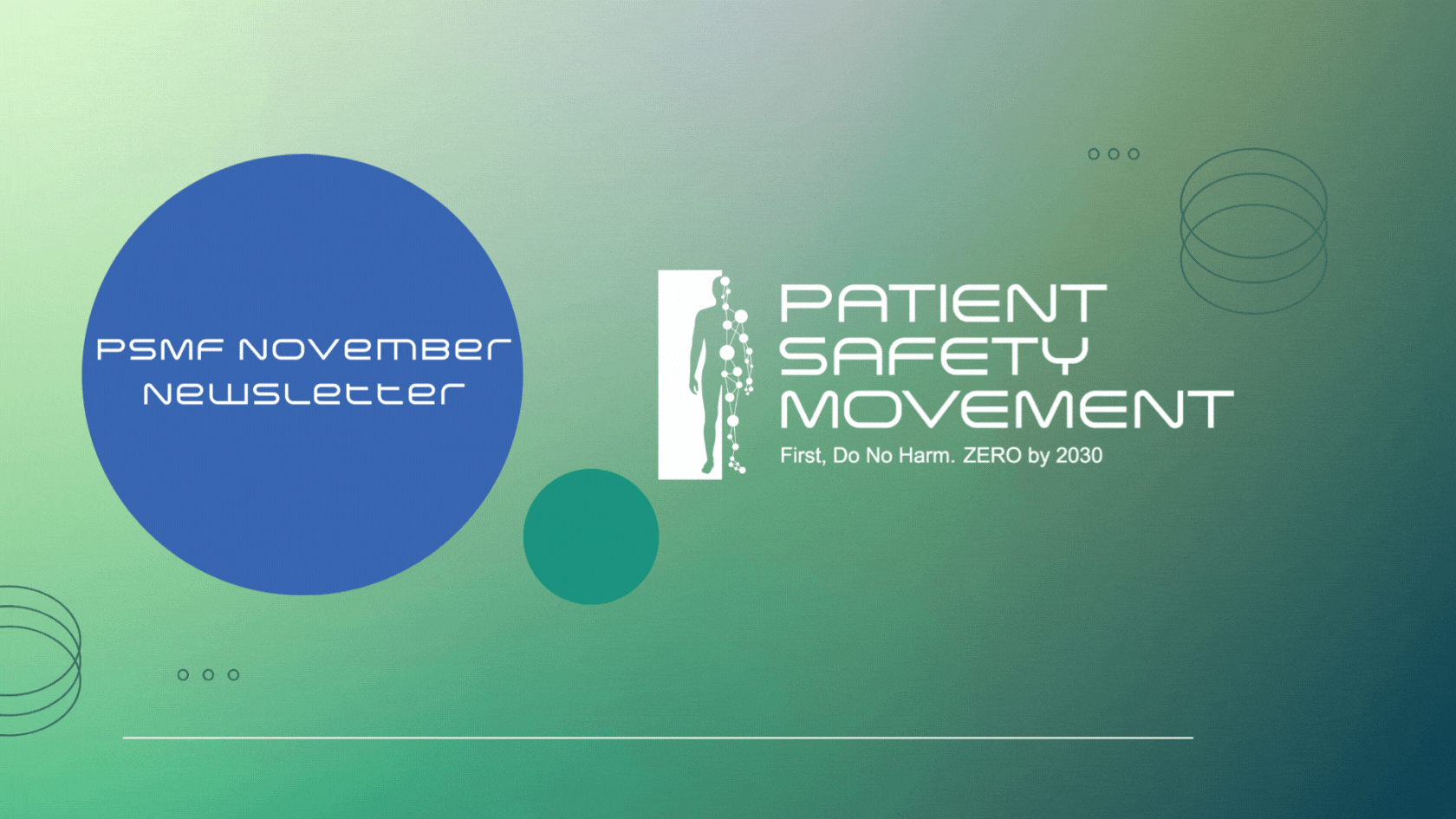
.gif?width=1200&upscale=true&name=Green%20Minimalist%20Professional%20Business%20Blog%20Banner%20(1).gif)
